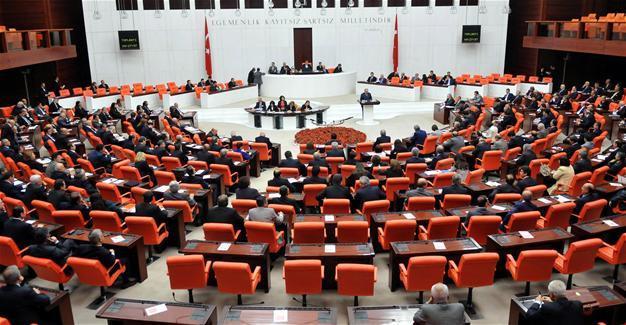Parliamentary panel to begin debating charter
Bülent Sarıoğlu - ANKARA

A parliamentary panel is set to begin debating a package of constitutional amendments that will usher in an executive presidential model on Dec. 20, although the ruling party is still mulling some minor changes to the blueprint.
Drafted by the ruling Justice and Development Party (AKP) after an agreement was secured with the Nationalist Movement Party (MHP), the charter will be subject to procedures over the coming weeks before it is submitted to a vote at the General Assembly.
Following the submission of the proposal to the parliament on Dec. 10, some members of the Justice and Development Party (AKP) raised some questions and skepticism about the functioning of the system framed in the constitutional amendment proposal, including reducing the age to be elected to 18, substitute representatives, the requirement that the president be born as a Turkish citizen and the uncertainty over the qualifications of the prospective vice presidents and ministers.
Prime Minister Binali Yıldırım and party executives who are in charge of the proposal will try to ease the concerns of the lawmakers as the parliamentary constitutional committee continues its work.
The first step will be taken on Dec. 21 when Yıldırım will brief lawmakers in a meeting as well as lead the central executive board of his party on the same day. Possible adjustments on the amendment are also being evaluated by AKP officials and presidency.
The AKP will seek the approval of MHP leader Devlet Bahçeli about the possible adjustments, Yıldırım has previously stated to AKP officials.
Reducing age to be elected from 25 to 18Among the articles that were criticized by AKP members is the reduction of the minimum age to be elected amid worries that youth organizations could lose motivation if they are not added to the election list.
Cemil Çiçek, an experienced member of the AKP and previous parliamentary speaker, also opposed this condition.
“My personal opinion is that even 25 is young. Politics is a hard practice. It necessitates experience. I do not view positively the substitute deputy matter either. The word substitute is an offensive word to start,” Çiçek said Dec. 17.
Members of parliament from different parties have argued that the substitute lawmakers could become a source of pressure on existing lawmakers and harm parliament’s reputation. They also state that being a deputy, which has a representative role, cannot be transformed into a career job by considering it the same as a municipal councilor.
Native-born TurksSome have also criticized the condition that only “trueborn Turkish citizens” – those who were born with Turkish citizenship – can run for president, noting that Labor and Social Security Minister Mehmet Müezzinoğlu would be disqualified, as while he is an ethnic Turk, he was born as a Greek citizen in Western Thrace before migrating to Turkey.
A large number of people from Western Thrace have conveyed their discomfort to the AKP on the matter they see as an exclusion, although some have suggested it might have been implemented as an “insurance policy” against Syrian asylum seekers who acquire citizenship in the future.
Qualifications of vice presidents uncertainThe qualifications of the vice presidents and the ministers, such as their age, education and the number of the vice presidents, are also not stated in the proposal. Some members of the parliament think that the vice presidents who will exercise the authority of the president should at least possess the conditions to be a lawmaker.
President to be a party leaderSome AKP members are demanding that the amendment should explicitly include the president’s party membership, as well as the fact that he may also be the leader of a party in order to prevent future problems. In this regard, Bahçeli’s attitude will determine the result.
Members of the HSYKWhen the proposal is enacted, the duties of the members of the High Council of Judges and Prosecutors (HSYK) will come to an end and new ones will be determined within a month. Some of the members of the HSYK, which has a mandate until 2018, have conveyed their concern over this matter.
The parliamentary committee has 45 days to examine the draft and issue a report to be discussed in the general assembly. The assembly will conduct two-pronged sessions on the amendment, discussing the articles in the first stage before voting on the entire bill in the second.
The bill will be submitted to a referendum if it gathers between 330 and 367 votes in the parliament, a likely scenario since the AKP has 316 seats and MHP has 39, while the other parties in parliament, the Republican People’s Party (CHP) and the Peoples’ Democratic Party (HDP) have said they are dead-set against the proposals on the grounds that it will consolidate a dictatorship.
 A parliamentary panel is set to begin debating a package of constitutional amendments that will usher in an executive presidential model on Dec. 20, although the ruling party is still mulling some minor changes to the blueprint.
A parliamentary panel is set to begin debating a package of constitutional amendments that will usher in an executive presidential model on Dec. 20, although the ruling party is still mulling some minor changes to the blueprint.